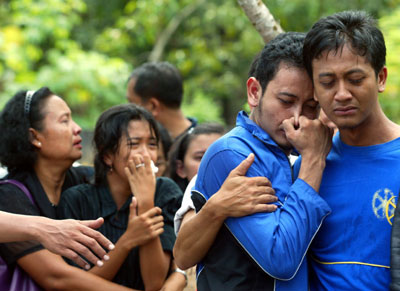Indonesia's government declared a state of emergency after a quake killed
more than 4,600 people, and rescue workers raced against time on Monday in the
hope of finding survivors under the debris of razed homes.

Indonesian youths cry
during the funeral of their mother at Bambang Lipuro district in Bantul,
near Yogyakarta, May 28, 2006. Rescue workers dug desperately for
survivors on Sunday and hospitals struggled to cope with the thousands of
injured, a day after an earthquake killed more than 4,600 people on
Indonesia's Java island. [Reuters] |
Some 35,000 buildings around the city of Yogyakarta were reduced to rubble
when a 6.3 magnitude earthquake struck at the crack of dawn on Saturday.
After a cabinet meeting late on Sunday, Vice President Jusuf Kalla said the
emergency period would last three months and the goverment aimed to complete
"reconstruction and rehabilitation" within a year.
"We will have an emergency period for three months, May till August. The
objectives are providing food, health care and shelter," Kalla told reporters.
"The funds needed are about 1 trillion rupiahs ($100 million) ... for
repairing homes and facilitating people's needs. This figure can change. It
comes from the state budget and international aid."
An estimated 35,000 homes and buildings had been destroyed and 50,000 people
needed help, Kalla said, adding that the quake had destroyed power facilities
worth 200 billion rupiahs.
Government figures put the number of injured at 2,155, but UNICEF (U.N.
children's fund) spokesman John Budd said 20,000 had been injured and more than
100,000 were homeless.
Trucks full of volunteers from Indonesian political parties and Islamic
groups, as well as military vehicles carrying soldiers, headed south from the
ancient royal city to Bantul, the area hardest hit.
"Thousands of houses are damaged and people may still be trapped beneath
them," Ghozali Situmorang, director general of aid management for the national
social department, told Yogyakarta radio.
Medical supplies and body bags arrived at the airport of Yogyakarta, about 25
km (15 miles) from the Indian Ocean coast. Saturday's quake was centred just
offshore.
The international community has offered medical teams and emergency supplies.
Indonesian President Susilo Bambang Yudhoyono has moved his office temporarily
to Yogyakarta.
A vulcanologist said the quake had heightened volcanic activity at nearby
Mount Merapi, which experts believe may be about to erupt. Merapi has been
rumbling for weeks and sporadically emitting hot lava and highly toxic hot gas.
The official death toll jumped to 4,611 on Sunday night, said the Social
Affairs Ministry's disaster task force.